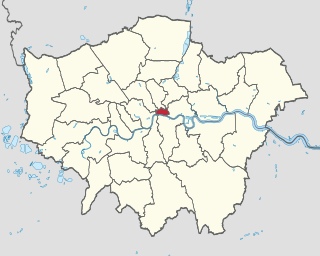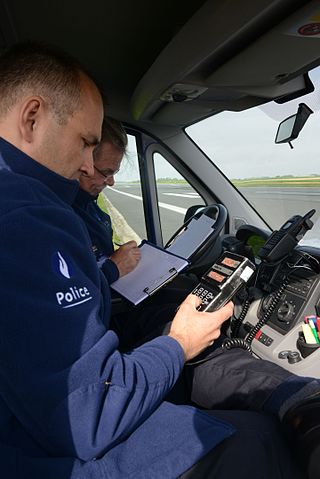Related Research Articles
The Specialist Crime Directorate (SCD) was one of the main branches of London's Metropolitan Police Service. It provided highly visible specialist policing services across the whole of London. Assistant Commissioner Mark Rowley had previously led the directorate but it was later led by Assistant Commissioner Cressida Dick. The Directorate led national police agency with regard to specialist crime investigations such as e-crime, sex crimes or kidnappings, hostage-taking and contract killings.

The Metropolitan Police Service (MPS), formerly and still commonly referred to as the Metropolitan Police, is the territorial police force responsible for law enforcement and the prevention of crime within the ceremonial county of Greater London. In addition, it is responsible for some specialised matters throughout the United Kingdom, including national counter-terrorism measures and the protection of specific people, such as the monarch and other members of the royal family, members of the government, and other officials.

The Police Service of Northern Ireland is the police force that serves Northern Ireland. It is the successor to the Royal Ulster Constabulary (RUC) after it was reformed and renamed in 2001 on the recommendation of the Patten Report.

The City of London Police is the territorial police force responsible for law enforcement within the City of London, England, including the Middle and Inner Temples. The force responsible for law enforcement within the remainder of the London region, outside the city, is the much larger Metropolitan Police, a separate organisation. The City of London, which is now primarily a financial business district with a small resident population but a large commuting workforce, is the historic core of London, and has an administrative history distinct from that of the rest of the metropolis, of which its separate police force is one manifestation.
The Serious Organised Crime Agency (SOCA) was a non-departmental public body of the Government of the United Kingdom which existed from 1 April 2006 until 7 October 2013. SOCA was a national law enforcement agency with Home Office sponsorship, established as a body corporate under Section 1 of the Serious Organised Crime and Police Act 2005. It operated within the United Kingdom and collaborated with many foreign law enforcement and intelligence agencies.
The Specialist Firearms Command is the firearms unit of the Metropolitan Police. The Command is responsible for providing a firearms-response capability, assisting the rest of the service which is not routinely armed.

Operation Trident, or simply Trident, is a Metropolitan Police unit originally set up in 1998 as an initiative with the police to tackle "black-on-black" gun crime following a series of shootings in the London boroughs of Lambeth and Brent. By 2008 the unit was responsible for investigating all non-fatal shootings for the Metropolitan Police, and in February 2012 the unit's remit was again expanded: the new Trident Gang Crime Command was launched, incorporating responsibility for tackling wider gang crime. In 2013 the unit gave up responsibility for investigating fatal shootings, which was taken over by the Homicide and Serious Crime Command.
James Maurice Hart, CBE, QPM, was Commissioner of the City of London Police between June 2002 and June 2006. In this role, he worked closely with the Chairman of the Police Committee, Alderman Simon Walsh, and chaired the Force's senior decision-making forum, the Strategic Management Board (SMB). He was Chairman of the Association of Chief Police Officers (ACPO) 'Economic Crime' portfolio and a regular public speaker on matters relating to economic crime and counter terrorism. He has completed the Government Cabinet Office 'Top Management' programme and is a graduate of the FBI National Executive Institute.
The Specialist, Organised & Economic Crime Command is a unit within the Gangs and Organised Crime group of Specialist Crime & Operations within London's Metropolitan Police Service. The unit's main responsibility is to both investigate and take steps to prevent fraud, along with a wide range of other fraudulent crimes which require specialist knowledge and training to investigate. The unit was previously known as the Fraud Squad, or by its previous Specialist Operations designation, SO6.
The Specialist Operations directorate is a unit of the Metropolitan Police of London, UK responsible for providing specialist policing capabilities including national security and counter-terrorism operations. The Specialist Operations Directorate is currently led by Assistant Commissioner Matt Jukes.

Law enforcement in Belgium is conducted by an integrated police service structured on the federal and local levels, made up of the Federal Police and the Local Police. Both forces are autonomous and subordinate to different authorities, but linked in regard to reciprocal support, recruitment, manpower mobility and common training.

The Federal Police, formerly known as the Policía Federal Preventiva and sometimes referred to in the U.S. as "Federales", was a Mexican national police force formed in 1999. In 2019 it was incorporated into the National Guard and operated under the authority of the Department of Security and Civil Protection.

The Police Corps of Andorra is the national police of Andorra. In 2007, the force had 240 officers serving a population of approximately 85,000.

The Belgian Federal Police is the national police force of the Kingdom of Belgium. It carries out specialized and supra-local administrative and judicial police operations, and supports local police services when needed. Additionally, the Federal Police is responsible for patrolling and ensuring the safety of the country's highways. The Federal Police has approximately 12,300 officers and civilian personnel.
The Homicide and Major Crime Command is an Operational Command Unit of the Metropolitan Police responsible for the investigation of homicide and other serious crimes in London. Most of their work was carried out by major investigation teams (MITs), of which there were 24. It was formerly known as the Homicide and Serious Crime Command.

The Metropolitan Police of Greater London, England is organised into four main directorates, each headed by an Assistant Commissioner, and four civilian-staffed support departments previously under the umbrella of Met Headquarters, each headed by a Chief Officer, the equivalent civilian grade to Assistant Commissioner. Each business groups or directorate has differing responsibilities. The commands are Frontline Policing, Met Operations, Specialist Operations and Professionalism.
Patricia Ferguson Gallan QPM is a former British police officer who served as Assistant Commissioner Specialist Crime and Operations of the Metropolitan Police in London. She previously served as Deputy Assistant Commissioner from 2012 to 2015, Assistant Chief Constable of Merseyside Police from February 2006 to 2012, and also served as temporary Deputy Chief Constable of the force from October 2009 to February 2010. She was the most senior female ethnic minority police officer in British history. She retired from the police service in August 2018.
Met Operations, also known as Met Ops, is one of the eight business groups which forms the Metropolitan Police Service and is responsible for providing operational support services.. It was created during the 2018-19 restructuring of the service, amalgamating many of its functions from the Operations side of the Specialist Crime & Operations Directorate formed in 2012, with the Specialist Crime side of that Directorate placed under the new Frontline Policing Directorate. The group is currently led by Temporary Assistant Commissioner Matt Twist.

Dame Lynne Gillian Owens, is a senior law enforcement officer in the United Kingdom. She was made interim Deputy Commissioner of the Metropolitan Police Service in September 2022 before being confirmed as that role's permanent holder in February 2023, the first-ever such female holder.

The Crime and Security Branch (CSB) – previously known as C3 – is responsible for the administration of national security, counter terrorism and serious crime investigations within the Garda Síochána, the national police force of Ireland. The section oversees intelligence relating to subversive, paramilitary and terrorism matters, conducts counter-intelligence, liaises with foreign law enforcement agencies, handles confidential informants, administers VIP and witness protection, monitors potential corrupt Garda officers and provides information on threats to the state to the Garda Commissioner and Government of Ireland.
References
- ↑ "New Assistant Commissioners' roles announced". Metropolitan Police Service. 1 November 2011. Retrieved 27 May 2014.
- ↑ "Central Operations". 27 June 2012. Archived from the original on 27 June 2012.
- ↑ "Metropolitan Police Service - Central Operations". Met.police.uk. Archived from the original on 20 May 2009. Retrieved 8 June 2009.
- ↑ Minutes of the meeting of the Metropolitan Police Authority held on 29 October 2009